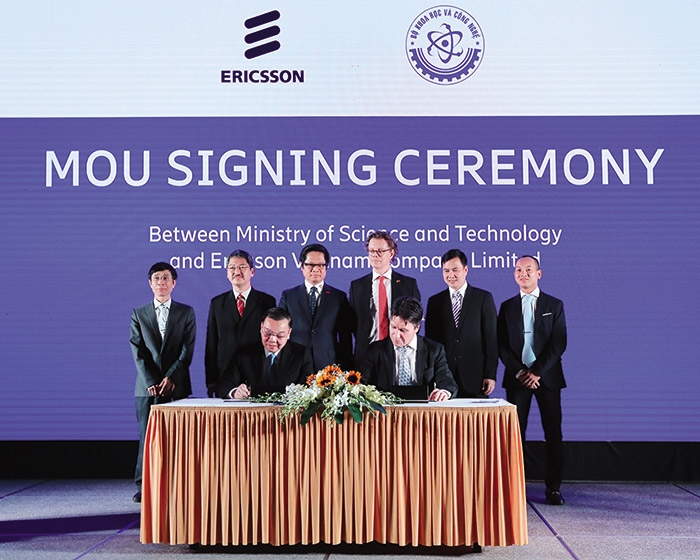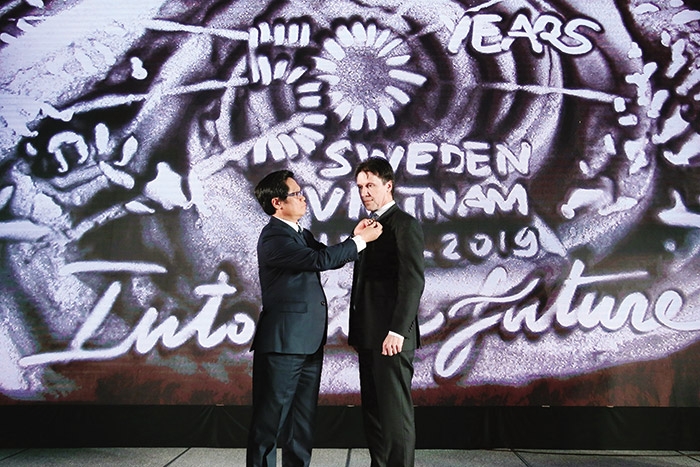Sowing the seeds of IoT Innovation
 |
| The signing of the MoU to build Ericsson Vietnam’s IoT Innovation Hub |
The Memorandum of Understanding (MoU) signed with the Vietnamese Ministry of Science and Technology last week marked an important milestone in the 25 years of operations of Ericsson Vietnam. Why did you choose to make the move this time?
The IoT Innovation Hub will be jointly established in 2019 by Ericsson and the Ministry of Science and Technology (MoST) at Hoa Lac High-Tech Park.
Its prime purpose is to accelerate the adoption of Industry 4.0 innovative applications across industries such as manufacturing, transport, and agriculture, making these industries more efficient and accessible through digital transformation. IoT marries the physical world to cyberspace, ensuring that objects or things, in addition to people, are connected to high speed mobile Internet.
Ericsson predicts that the number of cellular IoT connections is expected to reach 4.1 billion by 2024 – increasing at an annual growth rate of 27 per cent. This next wave of technological advancement promises that anything and everything that benefits from being connected to the Internet will be connected to the Internet.
The IoT Innovation Hub will be a research and development (R&D) platform, an education and training platform, and a startup entrepreneurship platform that creates an environment conducive to innovation, inviting a broad range of diverse stakeholders from the government, local and international businesses, startup entrepreneurs, students, and innovators to join forces and collaborate within a creative ecosystem that motivates and encourages the creation of new innovative use case applications that will ultimately transform all industries over time.
Data is the new oil of tomorrow that fuels the Internet, whilst the Internet is the engine that will increasingly drive Vietnam’s next wave of socioeconomic development, transforming Vietnam into a smart nation and knowledge-based ‘digital economy.’ Over the past three years alone, Vietnam’s digital or Internet economy has tripled in size, reaching $9 billion today.
Having been present in Vietnam for 25 years, what technology innovations has Ericsson brought to Vietnam? The Vietnamese government is now paying more attention to technology innovations to develop smart cities and e-government so as to better adapt to the digital age. How can Ericsson support Vietnam on this path?
Since 1993 when Ericsson first established its presence in Vietnam and launched mobile networks in partnership with the leading mobile operators, the poverty rate in Vietnam has dramatically decreased from 53 to less than 3 per cent in 2018. The country has diversified its economy whilst also enjoying an average GDP growth rate of over 6 per cent during the period as it transitioned from a low-income to a middle-income economy.
The advent of 2G (GSM) mobile communications in 1993, coupled with ubiquitous access to Internet connectivity through 3G and 4G mobile broadband networks, provided a greater number of people across Vietnam increased prosperity and opportunities for a better life, irrespective of whether they were residing in urban centers or regional, rural, and mountainous areas. Indeed, mobile communications drove and continues to drive an inclusive socioeconomic growth for all – ensuring no one is left behind.
The government has also recognised the need to encourage more foreign direct investment (FDI) in high-tech innovation with a stronger focus on technology transfer to local companies, whilst better integrating them into the global supply chains of foreign companies.
The establishment of our joint Ericsson and MoST IoT Innovation Hub will create an environment that is conducive to the facilitation of technology transfer and supply chain integration, as well as enhancing innovation export opportunities for Vietnamese companies.
 |
| Brunetti received a medal for his contributions in Vietnam |
How does the IoT Innovation Hub operate? What are its key impacts?
As the leading supplier of 4G mobile networks technology in Vietnam, working across all the mobile operators as strategic partners, Ericsson’s ambition is to favourably leverage this advanced capability and dominant market presence to actively facilitate and orchestrate pivotal ecosystem partnerships across government, mobile operators, network providers, application developers, content providers, startup entrepreneurs, and students by providing a space where it is safe and welcoming to innovate, experiment, fail fast, learn, and grow.
As Prime Minister Nguyen Xuan Phuc so eloquently described, failure is the mother of success and we need to encourage people in Vietnam to embrace opportunities, take calculated risks, dare to dream and not fear failure. Our IoT Innovation Hub will create a sense of safety and experimentation, and most importantly, a spirit of collaboration.
We view innovation as the key to Vietnam’s future prosperity and ongoing socioeconomic development, and we intend to invest in Vietnam’s future by leveraging the nation’s upcoming ICT talent, supporting the government’s ambition of becoming a top 10 software development and digital content outsourcing services nation in the near future.
We also plan to support the government and mobile operators in building the first 5G networks in Vietnam from 2020, with trials expected in the 2019 timeframe, leveraging the extensive 4G network infrastructure we have already supplied nationwide, seamlessly and cost efficiently upgrading it to 5G IoT capabilities.
The EU-Vietnam Free Trade Agreement (EVFTA) and the Comprehensive and Progressive Agreement for Trans-Pacific Partnership (CPTPP) are expected to take effect in 2019. What should the Vietnamese government do to encourage multinational technology groups like Ericsson to invest more in Vietnam, thus making greater contribution to the country's technology development?
The government has demonstrated strong visionary leadership in launching strategic initiatives to further stimulate and motivate European companies like Ericsson to invest in innovation. As an example, the prime minister of Vietnam invited the European Chamber of Commerce to become an active member of the Advisory Council for Administrative Reform (ACAPR) in late 2017, providing European businesses a chance to provide inputs and global insights on how to further improve the ease of doing business in Vietnam through simplified procedures, regulations, and legal frameworks.
The EVFTA motivates Ericsson to increasingly invest in innovation initiatives in Vietnam, focused on 4G and 5G IoT collaborations with the government and operators with the aim of supporting Vietnam’s Industry 4.0 agenda and the government’s recently launched ‘National Innovation Network Programme,’ particularly as it relates to increased technology transfer and building up Vietnam’s innovation capacity. Ericsson has subsequently forged a strategic IoT innovation partnership with the MoST on November 28, 2018, as well as intending to establish an R&D partnership in 2019 which will involve many talented Vietnamese software development engineers residing in Vietnam.
We view innovation as the key to Vietnam’s future prosperity and ongoing socioeconomic development, and we intend to invest in Vietnam’s future by leveraging the nation’s upcoming ICT talent, supporting the government’s ambition and vision.
How did you feel when receiving the medal for your contribution to sustainable business development in Vietnam by the Vietnam Chamber of Commerce and Industry (VCCI)?
I was extremely honoured and humbled to receive the medal from the VCCI. It is my second medal, having also received a medal of recognition from the Ministry of Information and Communications in 2014 for my contribution to the development of the ICT industry in Vietnam.
In both cases, I was extremely proud to be recognised and acknowledged by the Vietnamese government for my passion for Vietnam and its people, reflecting my respect for the government, the people, and the culture and traditions of Vietnam.
I wish to share this special recognition with my team at Ericsson Vietnam as they inspire me every day to make a difference, a positive change for the people of Vietnam by leveraging our assets, capabilities, and training staff and partners to focus on investing and ‘innovating technology for good.’
I wish to take this moment to especially thank chairman of the VCCI Vu Tien Loc, for his belief and trust in me and Ericsson, and I also wish to acknowledge the many wonderful hard working people of Ericsson across Vietnam, Myanmar, and across the world, for we indeed work as one team towards a commonly aligned interest and vision.
I am happy and truly blessed by this great honour bestowed upon me. I truly love Vietnam and its people, and I wish to continue the long journey that started for me in 1996 when I first began my association with Vietnam.
What the stars mean:
★ Poor ★ ★ Promising ★★★ Good ★★★★ Very good ★★★★★ Exceptional
Related Contents
Latest News
More News
- Middle East tensions set to test VN-Index, boost energy stocks (March 02, 2026 | 17:15)
- Agency of Foreign Trade warns of trade disruption due to Middle East conflict (March 02, 2026 | 17:11)
- Spring Fair 2026 boosts domestic demand (March 02, 2026 | 16:30)
- Law on Investment takes effect (March 02, 2026 | 16:21)
- Ho Chi Minh City attracts nearly $980 million in FDI in early 2026 (March 02, 2026 | 10:57)
- Academic-policy network planned to support VIFC development (February 28, 2026 | 08:00)
- Businesses bouncing back after turbulent year (February 27, 2026 | 16:42)
- VinaCapital launches Vietnam's first two strategic-beta ETFs (February 26, 2026 | 09:00)
- PM sets five key tasks to accelerate sci-tech development (February 26, 2026 | 08:00)
- PM outlines new tasks for healthcare sector (February 25, 2026 | 16:00)

 Tag:
Tag:



















 Mobile Version
Mobile Version